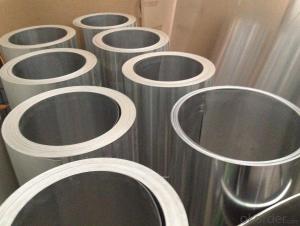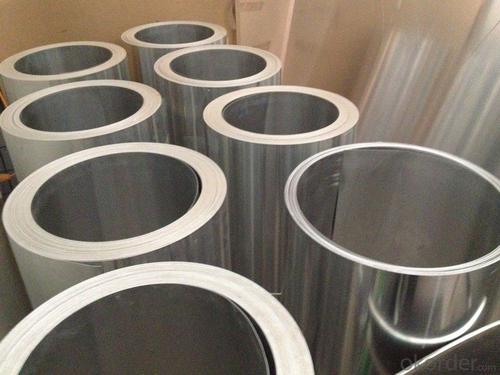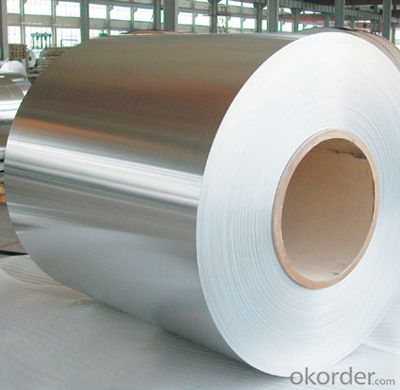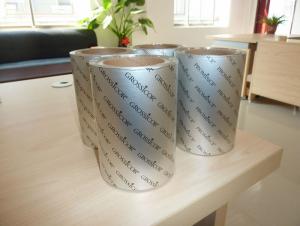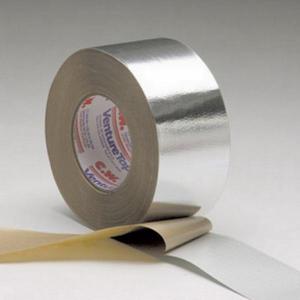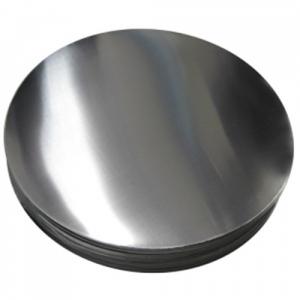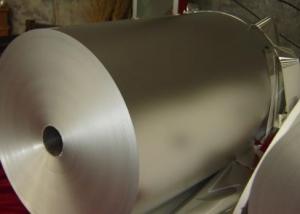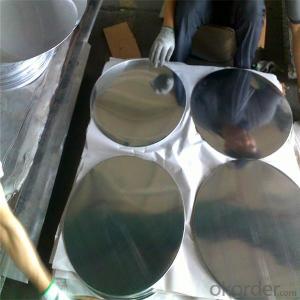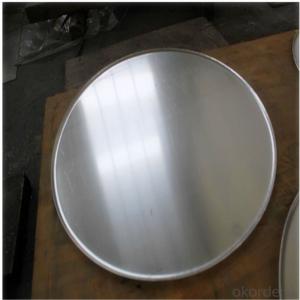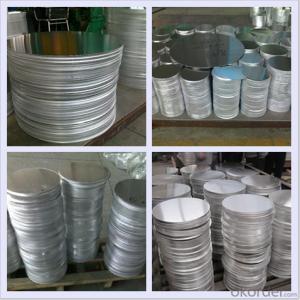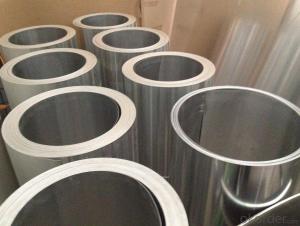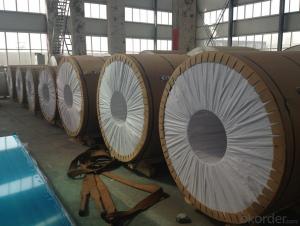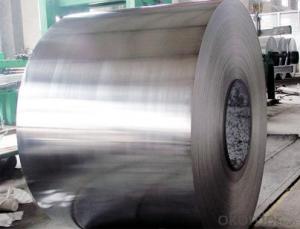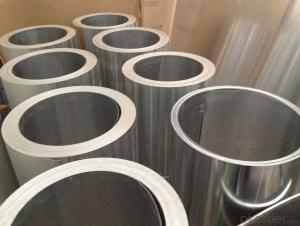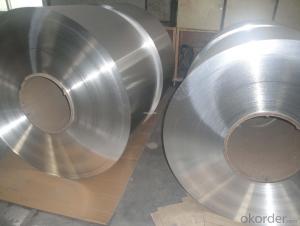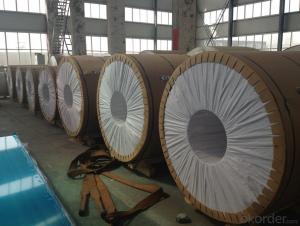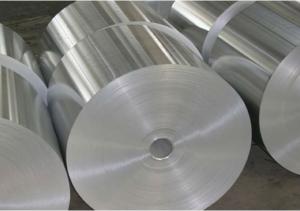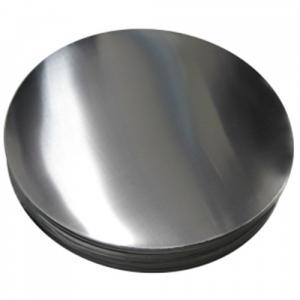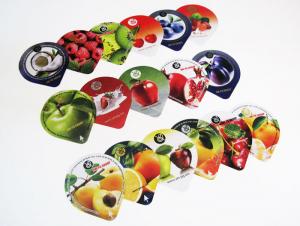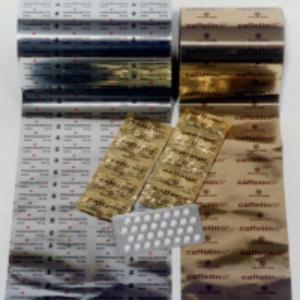Aluminum Prepainted Aluminum Coil for Gutter Making in China
- Loading Port:
- Shanghai
- Payment Terms:
- TT OR LC
- Min Order Qty:
- 5 m.t.
- Supply Capability:
- 100000 m.t./month
OKorder Service Pledge
OKorder Financial Service
You Might Also Like
Specification
Product Description
Commodity: Aluminum coil jumbo rolls
Alloy: 1050/1060/1100/1200/3003/3004/3005/3105/5005/5052/5754/5083/6061/8011
Temper: O, H12,H14,H16,H18,H22,H24,H32,H112,T6
Gauge: 0.2mm-8mm
CC and DC material with higher tensile strength and bigger elongation
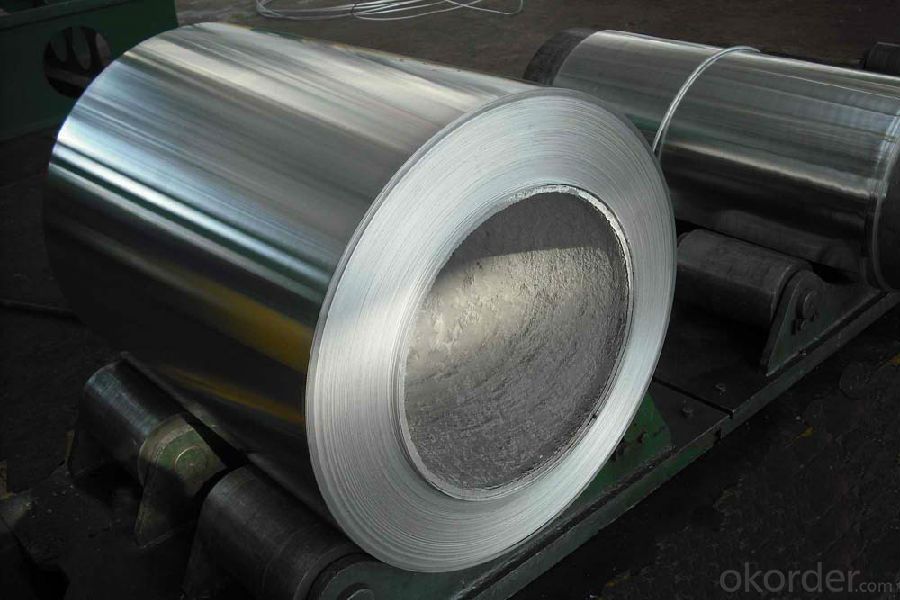
1.Specifications:
1. wood prepainted aluminum coil
for aluminium shutter
2. Aluminum Alloy: 3003H24, 3005H24, 3105H24 or 1 series, 5 series,
3. Thickness: any thickness range from 0.2mm to 1.5mm are available;
4. Width: any width range from 55mm to 1600mm are available;
5. Paint: PET, PVDF, Epoxy Resin;
6. Color: any color is available, as per your sample or our sample;
7. Coating hardness & adhesive: pensive hardness more than 2H; 1st grade adhesive;
8. Impact resistance: no cracking and peeling (50kg/cm, ASTMD-2794:1993)
9. Flexibility & MEK resistance: “T-bend”, 2T; MEK resistance more than 100;
Warranty: PET coating allows 5-10 years
10.Package: carton package and wooden pallet; 1Ton, 1.5Ton or 2 Tons as per your request;
11.Certificate: Certificate of origin;
Lidao Aluminum coil is mainly be used for roof, ceiling, curtain wall, al-plastic panel, aluminum veneers, perforated panel, aluminum tile, window, door, metal furniture, can or box for food,
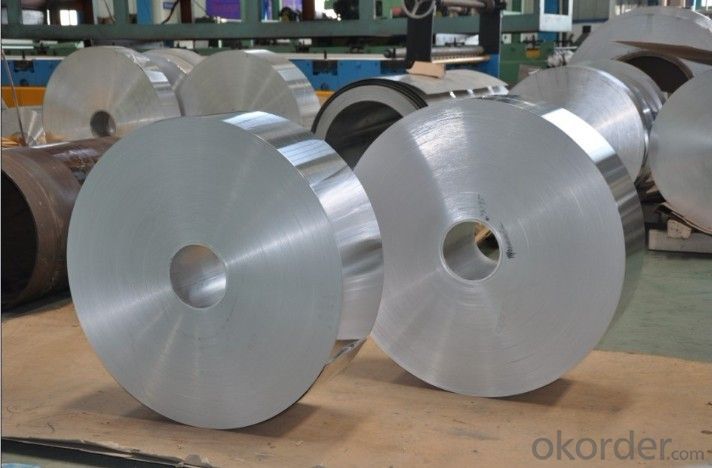
CNBM has passed ISO9001 and ISO14001 successfully, and also approved by American Food and Drug Administration (FDA). By the good product quality and professional service, we have set up a complete sales network. Until now, our products has exported to more than 20 countries and regions including Europe, USA, Canada, Brazil, Southeast Asia and middle east etc.
Our main products for aluminum coils are as follows:
Commodity | Alloy | Temper | Thickness /mm | Width /mm | |
Base material | 1235 1200 1140 8*** | H14 H18 | 0.25-1.00 | 950-1340 | |
Coil for PS | 1050 1060 | H18 | ≥0.2 | 830/920 1030/1050 | |
Sheets for PS | 1050 1060 1070 | H18 | 0.13-0.3 | 650-1300 | |
Strip for venetian blinds | 5052 | H19 | 0.13-0.3 | 300-1300 | |
Coils for composite panels | 1100 3003 3005 | H18/HX2 HX4/HX6 HX8 | 0.03-1.0 | 1000-1300 | |
Coils for other uses | 1100 1235 3004 5052 8011 | H14 H18 H24 O | 0.3-0.4 | 1000-1600 | |
Sheets/Strips for other uses | 5052 | O/H32/H34 | 0.07-2.0 | 950-1550 | |
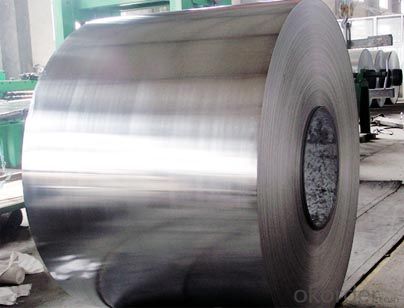
Our Services
CNBM is ready to assist with any product needs or enquiries. We value our customers and welcome your thoughts and feedback.
Please send comments, questions and requests through alibaba or our personal contact so they can be directed to the appropriate department.
About samples: Based on our company rules, a few samples are willing to be offered, but clients are requested to pay freight.
Working time:9:00~17:30(GM+8) from Monday to Friday, but you also can contact with us via personal contact information during our leisure time. We will try our best to offer you service in 24*7 hours.
Any quality, quantity problems are occured, response you will get in time not over more 24 hours after we recieve your complains. Problems will be solved in one week throught friendly negotiation.
FAQ
Q: Can you provide free samples?
A: Yes, free samples will be sent to you on freight at destination.
Q: Can I get your latest catalogue?
A: Yes, it will be sent to you in no time.
Q: What is the MOQ?
A: 5 tons
Q: What are your payment terms?
A: We accept L/C, D/A, D/P, T/T, West Union,etc.
If you are interested in our products, please do not hesitate to contact with us via following information
- Q: Is it possible to utilize recycled aluminum for the production of cars or other types of vehicles?
- <p>Yes, recycled aluminum can be used to make cars and other vehicles. It is common practice in the automotive industry to use recycled aluminum in the manufacturing process due to its lightweight and strong properties. Recycled aluminum requires less energy to produce than new aluminum, making it more sustainable. It is used in various parts of vehicles, including engine components, body panels, and wheels. The use of recycled aluminum not only reduces waste but also contributes to energy savings and carbon emission reductions in vehicle production.</p>
- Q: Explain the distinction between aluminum as a pure element and its alloys.
- <p>Aluminum is a lightweight, silvery-white metal found in the Earth's crust. It is a pure element with the symbol Al and atomic number 13. Aluminum alloys, on the other hand, are mixtures of aluminum with other elements such as copper, magnesium, manganese, and silicon. These alloys are created to enhance certain properties like strength, durability, and resistance to corrosion. While pure aluminum is soft and malleable, its alloys are stronger and more versatile, making them suitable for a wide range of applications from aerospace to construction.</p>
- Q: What characteristics distinguish pure aluminum from its alloyed forms?
- <p>Pure aluminum is a soft, lightweight, and highly malleable metal with good electrical and thermal conductivity. It is often used for its corrosion resistance and is relatively inexpensive. Aluminum alloys, on the other hand, are made by combining aluminum with other elements like copper, magnesium, silicon, or zinc to enhance its properties. These alloys are stronger, more durable, and can be tailored for specific applications, such as in aerospace, automotive, or construction. They offer improved strength-to-weight ratios, better resistance to heat and wear, and can be anodized for enhanced surface properties. While pure aluminum is more ductile and easier to weld, aluminum alloys provide greater versatility in terms of mechanical properties and performance.</p>
- Q: This question asks for a list of typical aluminum alloys that are widely used in various industries.
- <p>Common types of aluminum alloys include 1000 series, which are nearly pure aluminum; 2000 series, known for their strength due to copper content; 3000 series, which are alloyed with manganese for good formability; 5000 series, featuring magnesium for improved strength and corrosion resistance; 6000 series, which are popular for their strength and heat treatability; and 7000 series, recognized for their highest strength among aluminum alloys, often used in aerospace and automotive applications. Each series offers unique properties that make them suitable for specific applications.</p>
- Q: This question asks about the environmental impact of aluminum foil, including its production, usage, and disposal.
- <p>Aluminum foil has a significant environmental impact. Its production requires large amounts of energy, contributing to greenhouse gas emissions. The mining of bauxite, the primary source of aluminum, can lead to deforestation and habitat destruction. Additionally, improper disposal of aluminum foil contributes to littering and can end up in landfills, where it takes centuries to decompose. However, aluminum is also highly recyclable, and recycling reduces energy consumption and emissions. Efforts to reduce aluminum foil usage and increase recycling are crucial for mitigating its environmental impact.</p>
- Q: This question asks about the various applications of aluminum in the construction industry.
- <p>Aluminum is widely used in construction due to its lightweight, high strength, and corrosion resistance. It is commonly used in window frames, door frames, curtain walls, and roofing systems for its durability and energy efficiency. Aluminum is also utilized in structural components such as beams and columns, as well as in the manufacturing of prefabricated buildings. Additionally, it is used in the electrical wiring and conduits within buildings due to its excellent conductivity. Its versatility makes it a popular choice for both residential and commercial construction projects.</p>
- Q: What limitations are there regarding the use of aluminum in food and beverage packaging?
- <p>Yes, there are restrictions on using aluminum in food and drink packaging. Aluminum can leach into food or beverages, potentially causing health issues. Regulations vary by country but generally aim to minimize exposure. For instance, the U.S. FDA has guidelines on the use of aluminum in food contact substances. In Europe, the European Food Safety Authority (EFSA) sets limits on aluminum migration into food. Manufacturers must comply with these regulations to ensure safety and avoid health risks associated with aluminum exposure.</p>
- Q: Describe the process of aluminum oxide formation in a few sentences.
- <p>Aluminum oxide forms through a process known as oxidation, where aluminum reacts with oxygen in the air. This reaction is typically exothermic and can occur at room temperature, especially in the presence of moisture. When aluminum is exposed to oxygen, it forms a thin, protective layer of aluminum oxide on its surface. This layer prevents further oxidation and is what gives aluminum its corrosion resistance. In industrial settings, aluminum oxide can also be produced through electrolysis of aluminum oxide dissolved in molten cryolite.</p>
- Q: What benefits does aluminum offer compared to other metals?
- <p>Aluminum has several advantages over other metals, including its low density, which makes it lightweight and ideal for transportation applications. It also has excellent corrosion resistance due to the formation of a protective oxide layer. Aluminum is highly malleable and ductile, allowing it to be easily shaped and formed into various products. It is also a good conductor of heat and electricity, making it useful in electrical wiring and heat exchangers. Additionally, aluminum is abundant and relatively inexpensive compared to other metals, and it is recyclable, contributing to its sustainability.</p>
- Q: Describe the key differences between aluminum and stainless steel in terms of their properties and uses.
- <p>Aluminum and stainless steel are both metals with distinct properties. Aluminum is lightweight, corrosion-resistant, and has good thermal conductivity, making it ideal for applications like beverage cans, aircraft parts, and electrical wiring. It is also non-magnetic and has a lower melting point compared to steel. Stainless steel, on the other hand, is an alloy that contains chromium and is known for its strength, durability, and resistance to staining and corrosion. It is commonly used in cutlery, appliances, and construction materials. Stainless steel is heavier, stronger, and more resistant to high temperatures than aluminum.</p>
Send your message to us
Aluminum Prepainted Aluminum Coil for Gutter Making in China
- Loading Port:
- Shanghai
- Payment Terms:
- TT OR LC
- Min Order Qty:
- 5 m.t.
- Supply Capability:
- 100000 m.t./month
OKorder Service Pledge
OKorder Financial Service
Similar products
Hot products
Hot Searches
Related keywords
